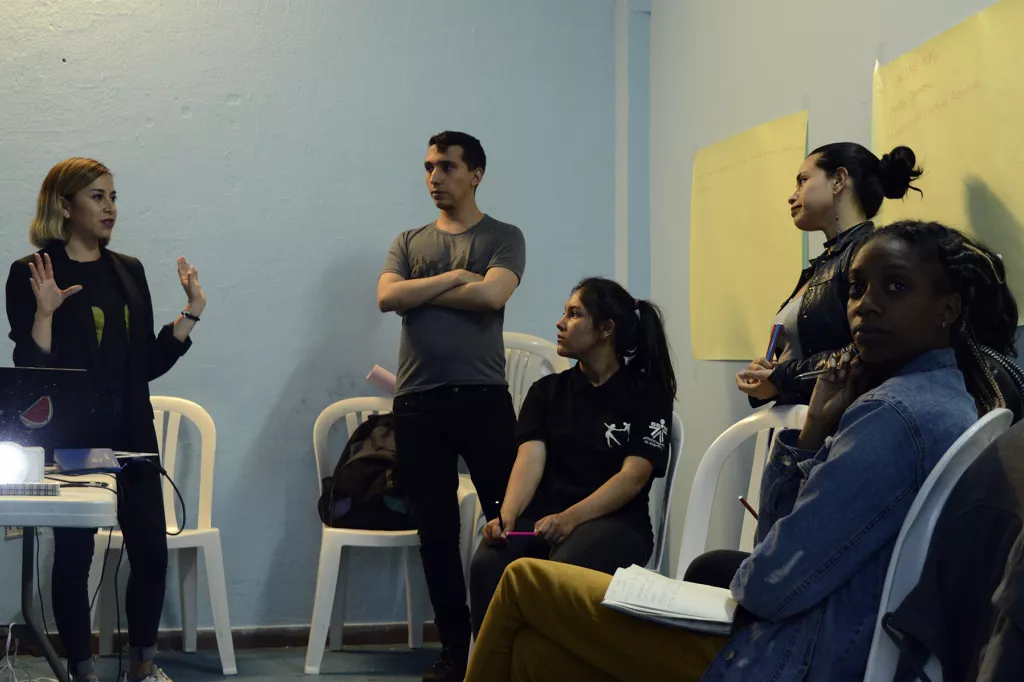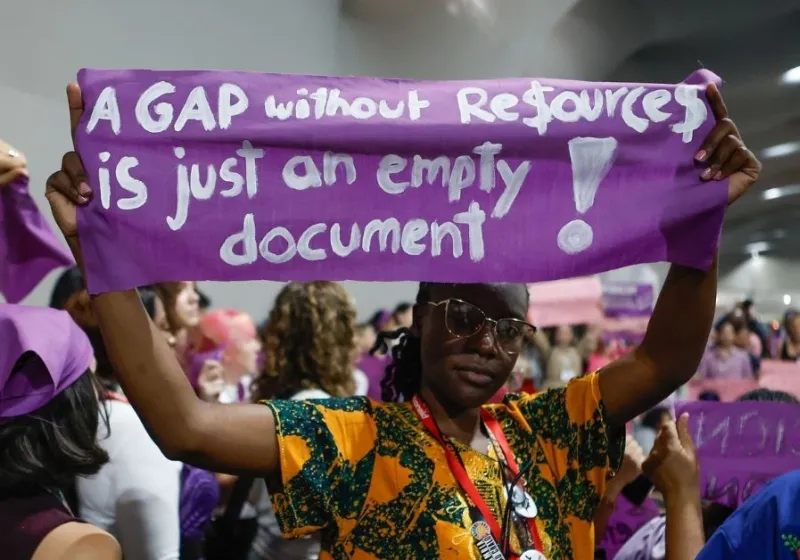Strengthening youth in Colombia through media

We meet Laura Leal, who is the coordinator of the Escuela de Medios Sin Comillas (Without Quotation Marks Media School) in a youth center in Fontibón, Bogotá. There are many different activities in the center and on our way to the media school workshop, we pass dancing classes and music recording in a small studio, that are some of the activities this evening. We are a bit early, so we have the chance to talk with Laura about their work and their role as a link between young people in Bogotá and the city's local community media.
Laura is a member of La Otra Juventud (The Other Youth), the organisation that created the Media School, and that started seven years ago as a radio station called Teusaradio in Bogotá.
At the beginning of 2019, they started the Media School to strengthen young people in journalism and alternative media linked to peace building and gender equality. Laura lets us know that the school is held in four different socio-economically vulnerable neighborhoods of Bogotá. Fontibón is one of them, the other three are Engativá, Kennedy, and Bosa. In these neighborhoods young people are struggling with problems of violence, poverty and inequality.
Telling the stories of the young
A group of participants between 16 and 30 years old is starting to gather around the big table, ready to start the class and learn more about multimedia. All of the participants are leading different collective projects on youth with topics such as non-violence and migration. The school focuses on interactive learning, so when the session starts, it includes both Laura explaining the topic, as well as group work and active participation. The group has been participating in the school for a while now, and they are a strong team, full of positive energy and laughter.
Later we talk to Héctor, one of the participants, to hear about the project that his group is leading, titled “What to expect when leaving school - the fertility of uncertainty”. His passion is to help young kids struggling to find their way in life. He tells us that their project is focusing on the uncertainties of being young, finishing high school, and trying to figure out what to do with their lives, in the tension between what they would like to do, and what the labour market offers them.
Héctor is a member of the collective Pájaros al vuelo (Birds on the fly) which applied to the School with the goal to reach out with their knowledge (they are professionals on different social sciences) and work for young people. He mentions the problems affecting youth in terms of economic and life insecurity, as well as violence. In Colombia, almost half of the population is below 25 years old, and youth unemployment is over 50% according to official statistics. In Fontibón in particular, they are struggling with problems of violence and unemployment levels that are above the average for Bogotá.
Laura is another participant, and she shares with us that her group’s project is focusing on telling the story of two young Venezuelan musicians, Eric and David, using their music as an income to survive in Colombia and to help their families back home. The crisis in Venezuela has led to the migration of over 1 million Venezuelans to Colombia, according to UNHCR, often struggling hard for their survival in Colombia.
For Laura and her colleagues, who are working on the project titled “I am leaving with everything and music, dude - stories of young migrants”, the Media School has been an important step to boost their educational backgrounds (in communications) towards finding their professional careers. Consequently, this experience has helped them to get out on the field and start telling young people's stories in Colombia.
Learning media to get their voices heard
The participants in the school have different projects focusing on youth, all with the same goal to spread their work in the local community media.
For Evi, the school has been very important to learn all the media tools necessary for their project and to get the experience of being out in the field collecting stories.
Evi is working in the same project with Laura, focusing on the two young Venezuelan musicians. She tells us that they want to show the people behind the migration, to show not only the young boys struggle but also their artistic talent. She explains that their final product will include both music videos, an interactive map of the musician's journey together with the reportage telling the story of the two young musicians.
Evi’s sister Aty is also part of the Media School, but they are in different project groups. Aty is working on the same group as Héctor, researching on the uncertainties of being young. She explains that their digital story is based on the investigation and interviews made at her own high school here in Fontibón.
Aty also explains that she has grown a lot during this experience, something that will help her in the future as she finds her way after finishing high school. Their final story will include both a podcast that addresses different themes, as well as infographics to help the young people that are struggling to find their way.
How did it all started?
Julián Bautista is also facilitating the workshop, he is one of the founders of La Otra Juventud (initially named Teusaradio, born from their passion for radio), and he tells us that he and his friend Ajax started making radio when they were studying at the university. They recorded the radio programs at each other's homes with amateur equipment.
The cooperation between La Otra Juventud and PeaceWorks goes back to 2015 when Julián and Ajax won micro funds from a project called “Young people active for a better world”, by PeaceWorks and ICYE Colombia.
It was with the micro funds that it all started, he continues explaining, when they could invest in a local to record their radio programs and invest in proper equipment. The radio station grew, and in 2018 they became a multimedia organisation. Currently La Otra Juventud is a strong organisation, recognised and awarded nationally for their work with media and youth.
Goals for the future
Despite the challenging situation for young people in Colombia and the struggle to get their voices heard, they are at the front line of social change. They believe in local engagement and education to reach a better future.
A couple of months later, we attend the event Lo Digital Transforma (Digital Transforms), organised by La Otra Juventud to bring together different media and youth initiatives. The first block of the event includes the presentation of some of the media products that were developed by the Media School in Fontibón. Here we meet again some of the participants, and also Andrés Rodríguez, who is the coordinator for PeaceWorks Colombia. After his welcoming words for the opening of the event, we talk with him and he expresses that they are proud of the journey they have had together with La Otra Juventud.
The Media School Sin Comillas will continue in 2020, focusing on post-production processes and the release of the digital projects from the participants of the school.
“We are very interested in continuing supporting the growth of the School in other areas of Bogotá, where the project hasn't taken place yet, and -why not- think about replicating it in other parts of the country”, says Andrés.
In the second half of next year, La Otra Juventud will focus on internal organisational strengthening, with the purpose of expanding the Media School in 2021. The aspiration for the future is that they will continue together empowering young people and raising their voices in Colombia.
Other recent articles

ForumCiv’s social media accounts labelled as “extremist materials” in Belarus
Important message to our Belarusian followers. Any interaction with our content can now lead to legal consequences in Belarus. Please read the information below and take the necessary precautions for...

ForumCiv enters new strategic partnership
ForumCiv is proud to announce a new three-year strategic partnership with Sida, totalling SEK 137 million.

ForumCiv at COP30: African voices at the centre of climate justice
ForumCiv is participating in COP30 in Belém to amplify the voices of African civil society, who stand at the frontlines of the climate crisis yet are often excluded from decision-making.